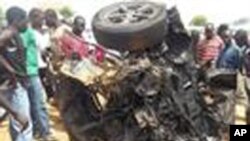In a further sign of our nation’s determination to help the nations of Africa combat terrorism, the United States has imposed sanctions on three individuals associated with the militant group known as Boko Haram, which has conducted a wave of violence across northern Nigeria. The U.S. move, aimed at disrupting the group’s finances, will hopefully diminish its capacity to conduct its attacks, the victims of which overwhelmingly have been innocent civilians.
Named in the U.S. action are Abubakar Shekau - believed to lead Boko Haram’s main cell - and Abubakar Adam Kambar and Khalid al-Barnawi, two individuals with close ties to al-Qa’ida in the Islamic Maghreb. Their identification as Specially Designated Global Terrorists blocks any bank accounts or other property subject to U.S. jurisdiction, and bars any U.S. citizen or company from engaging in transactions with or for the benefit of the three men, such as fund-raising.
Under Shekau’s leadership, Boko Haram has carried out attacks in northern Nigeria, part of a campaign against both the Nigerian government and western interests and influences in the region. In the last 18 months, the group or associated militants have killed more than 1,000 people, the most recent attacks coming June 18 in the city of Damaturu. Police and military targets were bombed, with damage spreading to at least two nearby schools. Churches, markets, businesses, media outlets and a United Nations office in Abuja have also been targeted.
The United States strongly condemns the violence and has offered its assistance in finding the perpetrators. Boko Haram uses legitimate grievances among residents of Northern Nigeria to gain recruits to its ranks, as well as public sympathy.
To address the political and socio-economic challenges of the region, the Nigerian government must effectively engage communities vulnerable to extremist violence and promote human rights practices among its security forces, whose often heavy handed tactics reinforce the concerns of many that the government doesn’t care about them. We stand ready to assist as needed to help meet these objectives as well.




